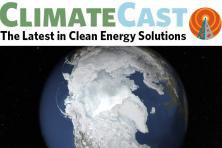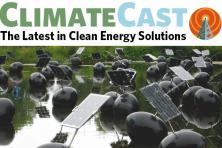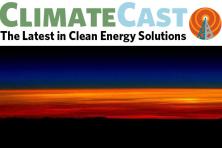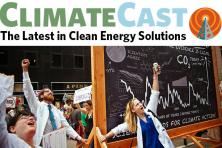Harnessing the power of wind and sun, and storing it for later!
The Belridge oil field near Bakersville, California is investing in a large-scale solar project to help power operations. While this may not seem like a clear-cut step forward for renewables, it does show how integrated renewable energy is becoming in our day-to-day life -- even being utilized in more traditional energy systems. Google has announced that it purchased enough wind and solar energy to offset its entire nonrenewable energy consumption. Finally, coming on the heels of Tesla’s November announcement that they completed the world’s largest energy storage facility in Australia, Hyundai just announced that the company will now create an even bigger grid battery storage facility in South Korea. These two projects are not only great in and of themselves, but they help dispel the myth that renewables are not a reliable power source for the grid.
Cities, cars, and cabs propel forward toward a clean energy future
More than 45 US mayors gathered in Chicago last week to form their own climate agreement, committing their cities to uphold emissions reductions as laid out in the Paris climate accord. Oregon’s Clean Energy Jobs bill—a cap-and-invest policy similar to California’s economy-wide cap on climate pollution—continues to see strong support across the state. As electric vehicle batteries continue to drop in price, the presence of electric vehicles increases throughout the world. London’s iconic black cabs are one of the latest fleets to make the switch.
The new normal: impacts and more impacts
Southern California is experiencing wildfires fueled by wind so intense that the local rating system classified them as “purple”, a level never previously recorded. Asthma rates are on the rise in the US -- a trend experts predict will only increase due to climate change. A new study finds that mussels do not adapt well to acidic water, even when the rates of acidity fluctuate.
The Trump administration has disbanded the Community Resilience Panel for Buildings and Infrastructure System, a group created by the Obama administration to help local officials protect residents against climate disasters, and to help local infrastructure become more resilient in the face of climate change. The new GOP tax plan would roll back provisions to incentivize clean energy use while making it easier to pursue oil, gas and coal projects. The EPA continues to remove references of climate change and the use of renewable energy from its website, a further indication that the agency is going soft on polluters. Media Matters’ Lisa Hymas argues in a recent editorial that the lack of American understanding about the severity of climate change is, in part, due to poor media coverage on the subject.
The (somewhat post apocalyptic sounding) future
A recent study has found that the world could warm more than four degrees Celsius by the end of the century, locking in severe impacts including prolonged heatwaves and major sea level rise. Greenland’s melting glaciers may someday flood coastal cities around the world. CNN has a new interactive map showing what percentage of coastal flooding would be attributable to the Greenland glacier melt. As California’s wildfires rage on, fire officials note that the state now faces a year-round fire season due, at least in part, to climate change.
In Brief: Corporations speak climate truth to power
Some US major corporations, from Mars to Walmart and many more, reaffirmed their commitment to sustainability and to acting on climate change at the Companies v Climate Change conference in Miami. The companies sought to show how environmental targets can be met even in the face of environmental rollbacks at the federal level.





